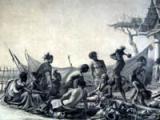What happened that day?
See historic events for any day of the year by entering the date below. Why not try your birthday?
Kiwi of the Week
Today in History

1772 Marion du Fresne arrives in Bay of Islands
The following month the French explorer and 24 of his crew were killed in an act of utu (revenge) by the Ngare Raumati iwi (tribe). In the reprisals that followed, the French killed up to 250 Māori.
Marion du Fresne shared the 18th-century philosopher Jean-Jacques Rousseau’s beliefs about the ‘noble savage’. But his fate convinced many in France that New Zealand was inhabited by dangerous natives and that its colonisation would be unwise.
He was the second French explorer to visit New Zealand, following Jean François Marie de Surville in 1769. The length of his visit enabled his surviving crew to provide many insights into Māori society. Some communication with Māori had been possible, thanks to an extensive Tahitian vocabulary that they had brought with them.
Why Marion du Fresne and his men were killed may never be known. Ngare Raumati were over-run by Ngāpuhi a few years later and no clear account from their perspective survived. The French may have transgressed in some way, possibly on the fateful day but more likely on a number of earlier occasions. It is probable that a five-week stay that showed no signs of ending had caused serious economic and cultural strains. Ngare Raumati may have feared that a permanent French settlement would be established.




















